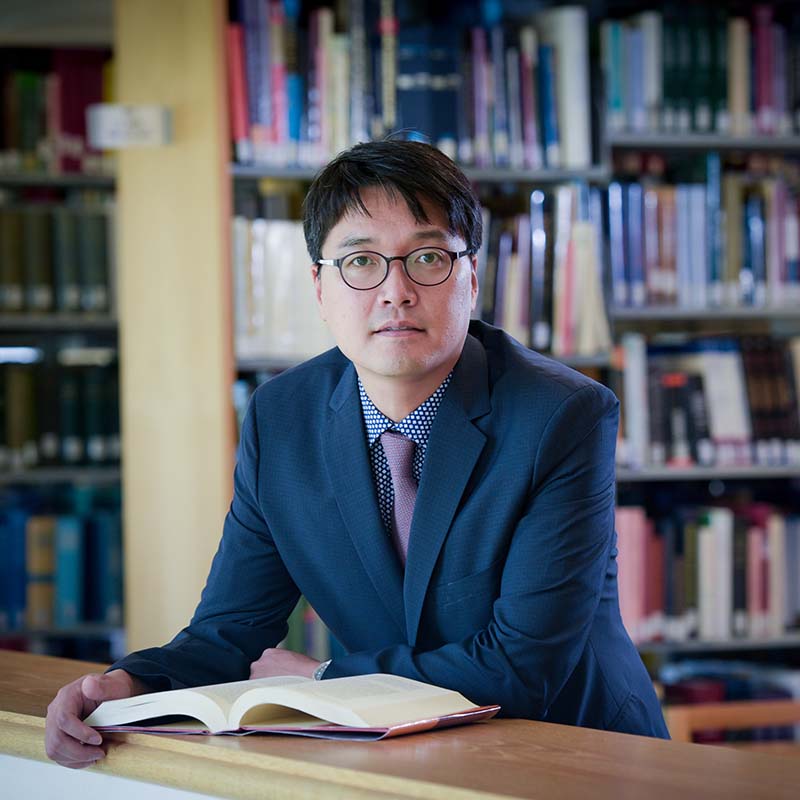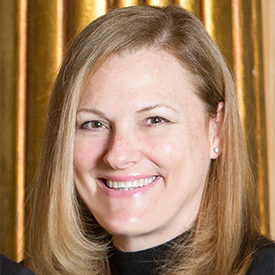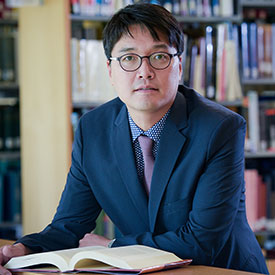Master of Arts in Teaching (M.A.T.)
Earn your Master of Arts (M.A.T.) in Teaching at Georgian Court University and join an education program with a long history of excellence in Ocean and Monmouth counties. Led by educators who are also strong role models, GCU is first and foremost dedicated to, and known for, exceptional teaching and learning. This program is offered only through GCU@Brookdale on Brookdale’s Lincroft, NJ, campus.
Program Highlights
Degree
1–2 years
Delivery
Cost
$840/credit
Total credits
Time of entry

Master of Arts (M.A.T.)
in Teaching
Blending theory and practice, our M.A.T. degree brings together faculty from diverse backgrounds who are deeply engaged in our students’ learning and actively involved in the campus community. Field experiences begin early in the program, giving you more opportunities to apply your learning and gain practical skills. You can also participate in GCU-funded research projects, conducting and presenting your work, often in close collaboration with faculty.
Special
Education
Every graduate of our program is qualified to teach special education, a highly sought-after skill set in today’s schools. For Georgian Court undergraduate students, the option to complete your teaching master’s degree in just one year (as part of our 4+1 program) also means exceptional time and cost savings.

Tailor your master’s degree in teaching according to your interests and career objectives. We offer four different teacher education programs for individuals who have already completed a bachelor’s degree:
- M.A.T. in Early Childhood (P–3) Education and Teacher of Students With Disabilities Endorsement: Learn to teach all subjects in general, inclusive, and/or special education settings for preschoolers up through pupils in third grade.
- M.A.T. in Elementary Education (K–6) and Teacher of Students With Disabilities Endorsement: Learn to teach all subjects in general, inclusive, and/or special education settings for kindergartners up through pupils in sixth grade.
- M.A.T. in Teacher of Specific Subject (K–12) and Teacher of Students With Disabilities Endorsement: Teach students ranging from kindergarten through Grade 12 in a single subject area in general, inclusive, and/or special education settings. Most GCU graduates who have completed this program go on to instruct art, biology, business, chemistry, English, history, math, or Spanish, depending on their major.
Program Information
Teacher Education Programs Leading to Master of Arts in Teaching (M.A.T.)
The School of Arts, Sciences, & Education offers three different teacher education programs for individuals who have already completed a bachelor’s degree, earning a cumulative GPA of at least 3.0. Each of the three teacher education programs leads to a Master of Arts in Teaching (M.A.T.) degree with a Certificate of Eligibility with Advanced Standing (CEAS) and an endorsement as a Teacher of Students with Disabilities (TOSD) from the New Jersey Department of Education in the following areas:
- Early Childhood Education (P–3);
- Elementary Education (K–6);
- Teacher of a Specific Subject (K–12 or Secondary Education in art, biology, business, chemistry, English, health and physical education, mathematics, psychology, or social studies).
The bachelor’s degree must be in a content major (minimum 30 credits); early childhood education (P–3) and elementary education (K–6) majors include: biology, chemistry, English, history, interdisciplinary studies, mathematics, natural sciences, psychology, and visual art; and Subject-Specific majors include biology, business, chemistry, exercise science, English, history, mathematics, psychology, and visual art.
M.A.T. Program Sequence
Semester 1: Core Competency Courses (Earn a B or better in each course.)
| Early Childhood Education | Elementary Education | Secondary Education | Clinical Hours |
|---|---|---|---|
| EDC5110 | EDC5110 | EDC5110 | |
| SPE5030 | SPE5030 | SPE5030 | CE (25 hrs.) |
Semester 2
| Early Childhood Education | Elementary Education | Secondary Education | Clinical Hours |
|---|---|---|---|
| ECE5201 | EDC5130 | EDC5130 | |
| EDC5242 | EDC5242 | ||
| SPE5032 | SPE5032 | SPE5032 | CE (25 hrs). |
Semester 3
| Early Childhood Education | Elementary Education | Secondary Education | Clinical Hours |
|---|---|---|---|
| EDC5209 | EDC5209 | EDC5250 | PT-CP (75 hrs.) |
| EDC5205 | EDC5205 | EDC5215 | |
| ECE5244 |
SEMESTER 4
| Early Childhood Education | Elementary Education | Secondary Education | Clinical Hours |
|---|---|---|---|
| EDC5306 | EDC5306 | EDC5260 | PT-CP (100 hrs.) |
| SPE5031 | SPE5031 | SPE5031 |
Semester 5
| Early Childhood Education | Elementary Education | Secondary Education | Clinical Hours |
|---|---|---|---|
| ECE6303 | EDC5309 | EDC5309 | |
| ECE6302 | EDC6404 | EDC6406 | FT-CP (14 wks.) |
Physiology and Hygiene
New Jersey Department of Education regulations requires all applicants for instructional certification to pass an examination in physiology and hygiene (P&H), including the effects of narcotics and alcohol. Candidates admitted to a teacher education program are required to self-study and pass the GCU P&H exam in the first semester.
Harassment, Intimidation & Bullying (HIB)
New Jersey Department of Education regulations requires all applicants for instructional certification to be trained in harassment, intimidation, and bullying (HIB). Candidates admitted to a teacher education program are required to self-study and pass the GCU HIB exam in the first semester.
Reporting Child Abuse and Neglect (CARE)
New Jersey Department of Education regulations requires all applicants for instructional certification to be trained in how to identify sign of child abuse and neglect and how to report such observances (CARE). Candidates admitted to a teacher education program are required to self-study and pass the GCU CARE exam in the first semester.
Clinical Experience & Clinical Practice
Georgian Court’s Teacher Education programs provide the candidate ample opportunity to develop not only theoretical knowledge about teaching and learning in general, inclusive, and special education, but the practical skills needed to plan instruction for a diverse group of students, manage classroom behaviors, work with school professionals, understand the culture and nuances of school, and interact positively with parents and caregivers. All teacher education programs include clinical experience in both inclusive and special education settings and three consecutive semesters of clinical practice.
To be approved for clinical practice, candidates must have an earned a cumulative grade point average of at least 3.0, passed the requisite Praxis II test(s), passed the GCU exams (P&H, HIB, and CARE), and completed all prerequisite and program courses. Clinical practice consists of three consecutive semesters of fieldwork, the first consisting of part-time practice (75 hours), the second continuing with part-time practice (100 hours), and the third semester being full-time practice. Full-time clinical practice consists of 14 weeks in which the candidate gradually assumes the responsibility for teaching. Placements for clinical practice are made by the director of field placement in collaboration with school district administrators to assure an appropriate match between the candidate and the school.
Concurrent with full-time Clinical Practice (9 credits), candidates participate in a Reflective Practice Seminar (3 credits) and are required to attend weekly meetings focusing on their clinical practice and the development of a comprehensive teaching portfolio. Additional Reflective Practice Seminar topics include, but are not limited to, classroom management, district policies, safety, school law, and emerging issues. Sharing clinical internship experiences and best practices in small groups, leading whole class discussions, learning about certification processes, honing job search skills through mock interviews, and developing a teaching portfolio are the cornerstones. Clinical practice is an intensive and critical professional experience. For this reason, School of Arts, Sciences, & Education policy prohibits clinical interns from taking other courses during clinical practice and strongly recommends that clinical interns not engage in employment during the 14-week clinical practice.
View the full curriculum and admission requirements. (Note: Educational Psychology is not a prerequisite for the M.A.T. Program for anyone applying to the program for an enrollment date after September, 2024)

Nancy B. Sardone, Ph.D.
Professor of Education
School of Arts, Sciences, and Education
Raymond Hall
nsardone@georgian.edu
732-987-2754

Hyuksoon Song, Ph.D.
Associate Professor
School of Arts, Sciences, and Education
Raymond Hall 208
hsong@georgian.edu
732-987-2751
If you’re interested in our advanced programs leading to a master’s degree, here are other programs at GCU you might want to explore:
- M.A. in Administration and Leadership
- M.Ed. or Certificate in Autism Spectrum Disorders
- Bilingual/Bicultural Education Endorsement
- Early Childhood Endorsement and M.Ed. Option
- English as a Second Language Endorsement and M.Ed. Option
- Teacher of Students With Disabilities Endorsement and M.Ed. Option
- M.Ed. in Reading/Literacy Specialization
- School Business Administrator Post-Master’s Endorsement
- M.Ed. in School Counseling
- Director of School Counseling Services Endorsement
- School Supervisor Post-Master’s Endorsement
Why Earn Your Master’s in Teaching at GCU?
Our comprehensive curriculum encompasses traditional learning and field experience. You’ll gain practical knowledge and skills that translate seamlessly into a thriving career in teaching, while saving time and money earning your master’s degree.
Here are more reasons to pursue your master’s in teaching at Georgian Court.
Diverse Experiences and Expertise
Led by experienced teacher educators who understand education from an academic point of view, our program is defined by a unique blend of theory and teaching expertise. Our faculty are educationally and demographically diverse, bringing a variety of perspectives to the classroom. We also benefit from a strong advisory board comprised of teachers, students, alumni, and school administrators.
Field Experiences and Research Opportunities
Our master’s in teaching gets you into the classroom early in your program—applying lessons from your coursework as you develop real-world professional skills. We also offer opportunities to study abroad and to work on research projects with faculty.
Faculty Who Are Supportive, Involved, and Engaged
At GCU, you’ll never feel like a number. Classes are small, and professors know your name. If you have a question, your instructors are here to help. Beyond the classroom, you’ll also find that our teaching faculty are actively involved in student organizations and other areas of campus life.
Acknowledged for Excellence
Georgian Court’s online graduate education programs, which include Master of Arts programs in areas such as autism spectrum disorders, English as a second language, and teacher of students with disabilities, were ranked #13 on GradReports’ 25 Best Online Master’s in Education Degree Programs 2020 list. Graduates from these GCU programs had a median starting salary of $53,700.
Maximum Value for Your Education
We offer financial aid and “pay-as-you-go” plans, as well as teacher loan forgiveness of up to $5,000 for teachers who teach for five years in low-income schools and meet other requirements. TEACH Grant funding may also be available depending on your selected program.

What Can You Do With a Master of Arts in Teaching?
Prepare to teach in diverse classrooms and school settings with an M.A.T. degree from GCU. Each of our four teacher education programs leads to a Master of Arts in Teaching degree with a Certificate of Eligibility with Advanced Standing (CEAS) and an endorsement as a Teacher of Students with Disabilities (TOSD) from the New Jersey Department of Education.
Master of Arts in Teaching Jobs
Examples of teaching jobs you may pursue with an M.A.T. degree include:
- kindergarten teacher,
- elementary school teacher,
- middle school teacher,
- high school teacher,
- special education teacher,
- parish teacher, and
- librarian.
Master of Arts in Teaching Salary
How much can you earn as a teacher? Here are average teaching salaries for New Jersey, grades K–12, based on recent data from the U.S. Bureau of Labor Statistics:
- elementary school teachers: $73,330
- middle school teachers: $74,950
- high school teachers: $78,900


Lafayette Mills Elementary School
Request More Info
IMAGINE YOUR FUTURE AT
GEORGIAN COURT
LEARN HOW TO APPLY
We make applying easy. Get all the details on what you need to start your journey at GCU.
Visit Us
Seeing is believing. Take a look at our campus by driving, walking, or exploring our virtual tour.
GET MORE INFORMATION
Reach out to us and learn more about all GCU has to offer you.
